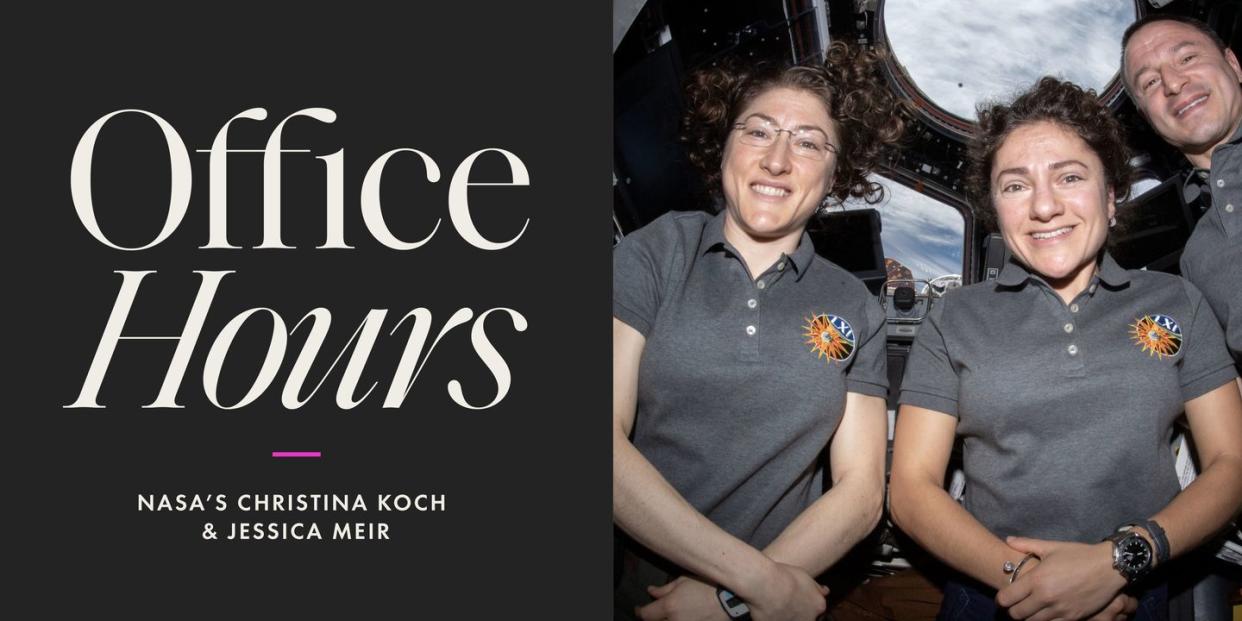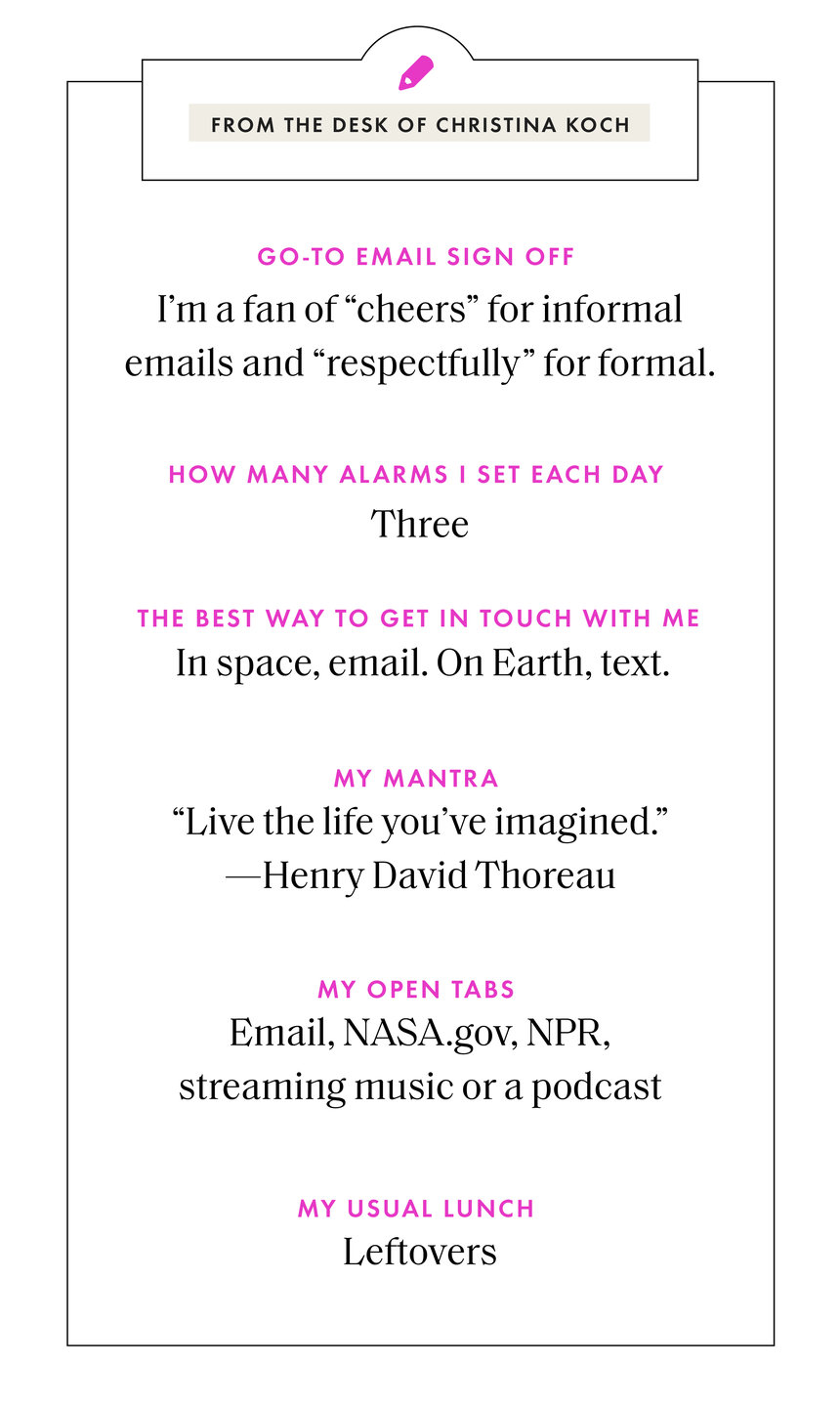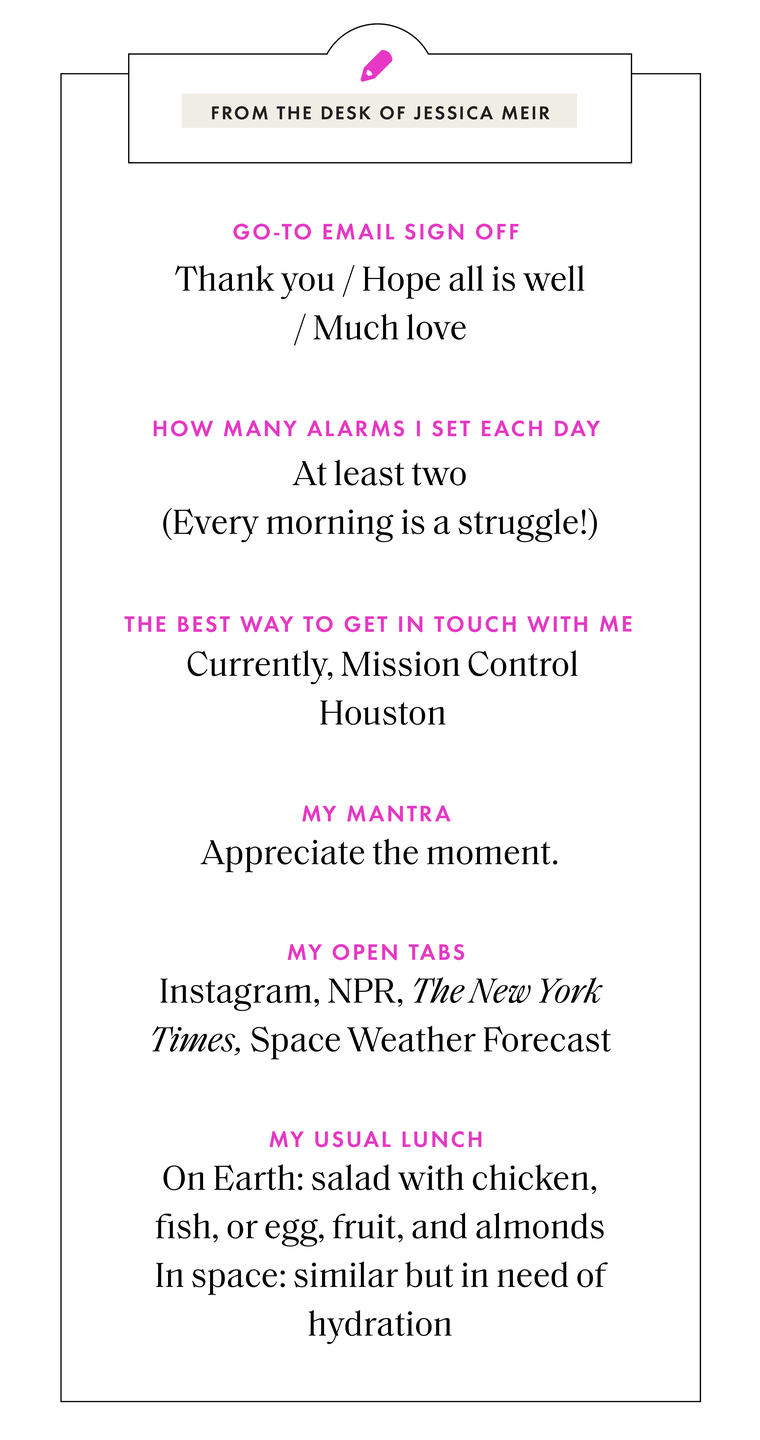Astronauts Christina Koch and Jessica Meir on Self Care in Space and Being a Good NASA Work Wife

In ELLE.com's monthly series Office Hours, we ask people in powerful positions to take us through their first jobs, worst jobs, and everything in between.
Christina Koch and Jessica Meir keep making history. Last October, the NASA co-workers and best friends completed the first all-female spacewalk outside the International Space Station to repair a power controller. While Meir is still working in the ISS, Koch is back on Earth having returned earlier this month after a record-breaking 328 days in space. As the longest single spaceflight conducted by a female, Koch’s stay will allow researchers to study the long-term effects of space on women.
ELLE.com spoke to the two astronauts when they were still together in space to find out how they maintain a healthy work wife relationship and make time for self care while hurtling through the galaxy.
My first job
Jessica Meir: "I was a lifeguard when I was in high school. After college, my first job was as a support scientist at the NASA Johnson Space Center for Lockheed Martin. I stayed there for three years, and then I left to pursue my graduate work. I didn't think that I would actually end up going back there. But when this opportunity came up, I couldn't say no."
Christina Koch: "Working at a toy store. I learned general responsibility and to be someone who takes care of problems for other people. My first job out of college was actually at NASA. I got my degree in physics and electrical engineering and was lucky that my summer internship turned into a full-time job. I got to design instruments that fly on planetary probes and [working on] NASA missions that study the Earth and other planets. I ended up leaving that job to pursue a dream to work in Antarctica, but that’s a different story."

My worst job
Meir: "[A] temporary job waitressing at a bar and grill for a few weeks at the end of summer before returning to college. There were no bussers or dishwashers—the wait-staff waited tables, cleared them, and processed dirty dishes into the hot and steamy kitchen. At the end of the meal, apparently because I had neglected to deliver one drink refill to a customer during an extremely hectic shift, a customer glanced up at me while signing his credit card receipt and slowly and deliberately wrote a very large $0 on the tip line."
My big rejection
Meir: "When I was first realistically competitive, I started applying [for this job], and I did get an interview the second time I applied. I made it all the way to the final round, the final 50 people, and everything went really well. In the end I got the phone call that said, 'You did a great job. We encourage you to apply again, but we're only selecting nine people and you're not one of them.' It was heartbreaking. I always encourage people [to] make sure that you don't give up."
How to manage stress in space
Koch: "Looking out the window is an amazing escape. The Earth is phenomenally beautiful. Usually anything can be cured by looking at the Earth below us and remembering where we are."
The key to being a great NASA work wife
Meir: "We actually have a buzzword for it: expeditionary skills. Basically, when you sum it up, [it's] how to play nicely with others—the kind of advice that you would give your own children. Those things are especially important when we talk about long-duration missions, like the six months or longer missions that we have on the International Space Station, and especially for the future, when we start thinking about going to further destinations, like the moon and to Mars. We emphasize aspects like teamwork, self care, team care, leadership, followership, all of those things that really help people get along well, and I think are critical to mission success."
Spacewalk time! After all the technical studying, airlock prepping, and conferencing, @Astro_Jessica and I multitask as we do our final briefing.
💡Spacewalk hair pro tip: Double braid is the way to go--fits snug under the com cap, out of the helmet seal, and no flyaways! pic.twitter.com/C9PgvA9FLN— Christina H Koch (@Astro_Christina) January 19, 2020
Koch: "Another skill that's very important both up here in accomplishing our mission, and just day-to-day in our own relationships on the personal side, would be communication. Understanding what really motivates people, what they really need in any given situation, and recognizing that we can usually mitigate anything that comes up by open and clear communication."
Go-to office snacks
Koch: "We don’t have a lot of time in between our activities because we’re scheduled down to five minute increments. Sometimes we just have to run and get a nutrition bar or a handful of nuts."
On finding time for self care
Koch: "We like to joke that the only difference between the Space Station during work and during our off time is whether or not the cameras are on, meaning Mission Control is watching work. At the end of the day, we turn the cameras off and have dinner, and what we consider our personal time. But the physical space is the same, so having that work-life balance is even more important here. We have 12-hour workdays. We spend a lot of time working, but depending on how different people charge their batteries in their off time, we make sure and honor that."

How to find your footing, literally, in space:
Meir: "One of the unexpected things that was really interesting to me [about the job], especially given my background as a physiologist, was how your brain adapts to the environment. We are so conditioned on the ground to think feet are 'down,' and if I drop something, it's going to fall down to my feet. Of course, that doesn't happen here, but it's really difficult to convince your brain that.
One minute we might be working in this plane, and then the next second, like Christina is doing [skip to 7:22 in the below video to see Koch demonstrate], you might have to come up here and work in the ceiling location. What I found when I first arrived was if I went up there and was working, suddenly my brain would flip flop, and I would swear that I was back on the floor. The really interesting part was that it had been about two weeks, [and] I felt that my brain was already changing. It seemed to be using some visual cues for spatial orientation, instead of that reference to 'down,' and the brain just made up for that big change in such a fast manner. It really shows the plasticity of the human brain and really what we're capable of as humans."
These answers have been edited and condensed for clarity. Watch the entire, unedited interview in the video above. Additional questions were answered via email.
You Might Also Like


